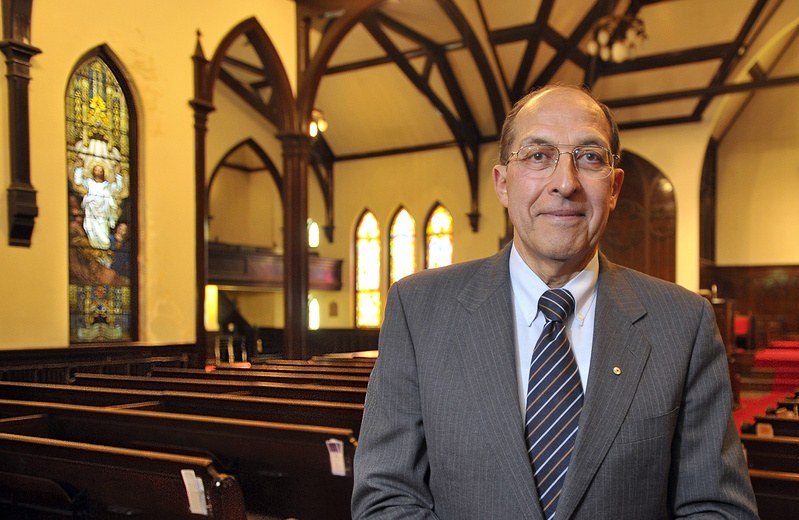PORTLAND — The City Council voted 6-3 Monday night to approve a controversial request to rezone a historic church to allow offices in one of the city’s most prestigious neighborhoods.
Nearly 50 people spoke during nearly two hours of public testimony before the City Council voted at 11:35 p.m., with Councilors Cheryl Leeman, John Coyne and John Anton casting the dissenting votes.
“In my opinion, this is a pretty benign way to make sure this building gets preserved,” said Councilor Ed Suslovic, who voted in favor of the proposal along with Councilors David Marshall, Kevin Donoghue, Jill Duson and Nicholas Mavodones, and Mayor Michael Brennan.
Opponents of the zoning change argued that allowing offices on Thomas Street would change the fabric of the neighborhood and set a dangerous precedent for other neighborhoods.
Supporters argued that the rezoning would allow for the preservation of two local landmarks, with little impact on the neighborhood.
The Williston-West Church was bought for $675,000 in December by Frank Monsour, an Australian businessman who wants to use the Parish House as the U.S. headquarters for his technology development startup, Global Majella Technologies.
Offices are not allowed in Portland’s residential zones. The conditional rezoning will allow Monsour to convert as much as 2,800 square feet of the Parish House into office space for as many as 14 employees, who will park elsewhere.
Office space will be leased to his company at above-market rates to generate revenue for needed and costly repairs to the church, beginning with the replacement of an asphalt roof with a pea-green slate roof, estimated to cost $275,000.
Monsour also wants to convert the Parish House into as many as three residences, one of which would be used by his family when they’re in the U.S.
The 135-year-old church sanctuary will be renovated and possibly used as a community hall, if the Planning Board approves that use. Estimates to restore the sanctuary range from $500,000 to $1 million.
Built in 1877, the church was designed in the High Gothic Victorian style by Francis Fassett. The 11,000-square-foot Parish House, designed by Portland’s famous architect, John Calvin Stevens, was added in 1904.
The church is on the National Register of Historic Places. As a condition of approval, the developer will have to renovate the sanctuary within two years, with a possible one-year extension, and report progress to the city.
The Planning Board held two workshops on the proposal, which elicited about nine hours of public testimony and nearly 100 letters.
City planners supported the proposal, and the Planning Board endorsed it by a 5-2 vote last month.
Opponents who spoke Monday night questioned the motivation for the rezoning effort, often referring to Monsour as “a hard-nosed Australian businessman” who has not adequately engaged the neighborhood.
Anne Pringle, president of the Western Promenade Neighborhood Association, said the group collected 137 petition signatures in opposition to the proposal.
“(Monsour) is a hard-nosed businessman who wants to plop his business in our neighborhood, which he says he loves,” Pringle said. “I say, take his love elsewhere where it might be requited.”
West End residents have long fought what they call “commercial encroachment” into their neighborhood, primarily from institutions like Maine Medical Center and Waynflete School.
Judy Delogu said that if councilors approved the proposal, it would be akin to “selling my historic neighborhood down the river.”
While opponents said a rezoning would set a precedent citywide, supporters argued that the preservation of Williston-West Church is a unique case. Some criticized their neighbors for treating the West End like a gated community.
David Eaton, who lives on Spring Street, about half a block from the church, said the proposal presented a unique opportunity.
“Its conversion will spawn tremendous investment and help preserve a valuable building,” Eaton said. “I believe this developer has demonstrated his commitment to preserve that use.”
Tish Whipple of Thomas Street said she and 95 West End residents sent postcards in support of the plan to Councilor David Marshall. “I think it would be a most positive change and use for the building,” she said.
Opponents, however, argued that Monsour has not demonstrated the need to generate the revenue to restore the building. If needed, they suggested he could convert the building entirely into residences.
A couple of local architects said that isn’t a viable option.
“I’m maintaining there is not a residential option for this building,” said Constance Bloomfield, an architect who looked into the issue.
But for most of the opposition, it was just a matter of trust.
“I frankly don’t trust the developer,” said Sam Damico of Thomas Street. “There are too many unanswered questions.”
Staff Writer Randy Billings can be contacted at 791-6346 or at: rbillings@mainetoday.com
Twitter: @randybillings
Send questions/comments to the editors.



